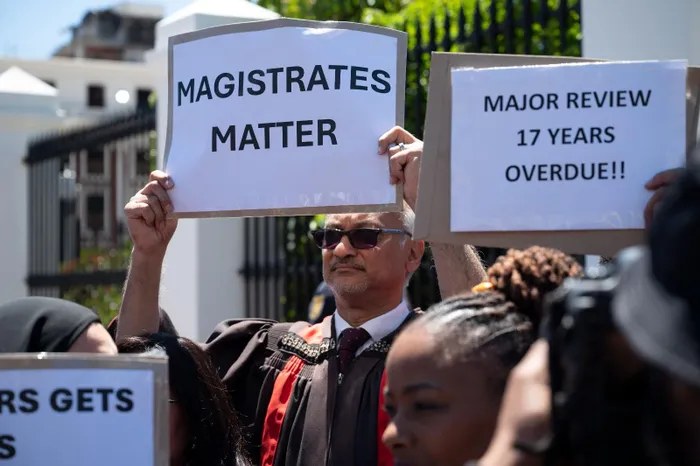Magistrates demand safety reforms in South Africa

Western Cape magistrates marched to Parliament where they presented a memorandum demanding judicial reforms, improved salaries, and recognition as 'judges of the lower court'.
Image: Armand Hough / Independent Newspapers
South Africa’s justice system is facing a worsening threat, not just from criminals, but from dangers directed at the very people tasked with upholding the law.
According to the latest national survey documenting magistrates’ perceptions, nearly a third of judicial officers reported being threatened or harmed in direct connection with their work. The findings paint a stark picture: courtrooms and surrounding facilities have become potential danger zones.
Twenty-three per cent of magistrates said they were threatened or harmed “once or twice” within a 12-month period, while a further 10% reported multiple incidents. The Western Cape emerged as the most dangerous province, with 39% of magistrates reporting threats, highlighting deep regional disparities in safety.
Threats are not limited to criminal trials. Magistrates presiding over civil disputes — often assumed to be low-risk — reported higher levels of intimidation, showing how embedded the problem has become across the legal landscape.
The survey also revealed alarming gaps in basic security. More than a quarter of magistrates said safety measures in courtrooms, public waiting areas, and parking zones are effectively “non-existent,” making arriving at and leaving work a moment of heightened vulnerability.
One magistrate described a recent experience during a criminal trial: “There were a lot of people in the gallery and one person gestured [by] slitting of [the] throat. She did it twice and kept moving in and out of the courtroom, trying to disrupt the case. I eventually adjourned the matter because it was a huge security risk. They even followed me when I adjourned for tea, but I had mentally prepared myself and they didn’t know which door I used.”
Another magistrate recalled how people in the gallery took photographs of her in court and posted them online. “I am not even on Facebook; I was alerted by a policeman who asked if I knew I was on Facebook. We just don’t have the security we need.”
Neelan Karikan, President of the Judicial Officers Association of South Africa (JOASA), described the situation as dire. “Lower court judges are being disrespected and disempowered. Inside the working space, safety should be the number one priority, which falls squarely in the hands of the Department of Justice. Public access to judges when entering or leaving their workspace must be controlled, and only authorised personnel should be permitted in chambers.”
Karikan added that risk assessments should be conducted outside court buildings, and safety upgrades must be treated with urgency. JOASA encourages magistrates to report concerns immediately and for management to escalate these issues with confidentiality.
The unrest has led magistrates to stage protests in front of Parliament and picket outside courts, seeking recognition as part of a unified judiciary rather than being treated as lesser judicial officers. JOASA has also received support from the Judges Association of Namibia, which stated: “If one branch of justice is shaken, the whole tree of freedom trembles.”
Efforts to obtain comment from the Magistrates Commission were unsuccessful by the Weekend Argus’s deadline.
tracy-lynn.ruiters@inl.co.za
Related Topics: